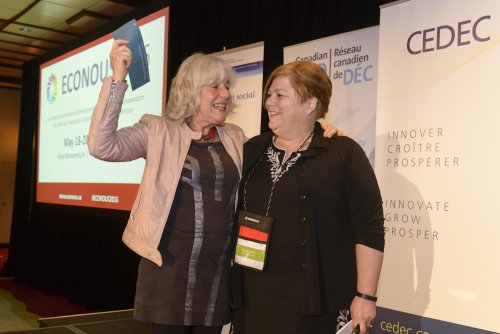 The Ontario Co-operative Association are still accepting applications for the critically acclaimed Fundamentals of Co-operative Organizations (FCO) certificate program, which begins January 12 and ends March 25, 2017.
The Ontario Co-operative Association are still accepting applications for the critically acclaimed Fundamentals of Co-operative Organizations (FCO) certificate program, which begins January 12 and ends March 25, 2017.
The program is results-driven, practical and optimized for working professionals. Designed to equip co-operative businesses with highly skilled leaders, graduates will ultimately strengthen their co-operative organizations with their capacity to respond to the unique challenges they face. Some of the key things program participants will gain are:
- LEARNING specialized knowledge in areas such as governance, membership development, legislation, financing and co-op development;
- DEVELOPING critical thinking, management and leadership skills;
- ADVANCING their career in the co-operative sector; and
- STRENGTHENING network connections of colleagues from across the sector.
The curriculum has been developed by leading co-op executives in partnership with York University’s Schulich School of Business. It combines both an integrated online and in-class component, which are optimized to work around participants’ busy schedules. The program emphasizes teamwork and provides students with insights into leadership and organizational dynamics, while creating opportunities to build relationships with peers and professors. Invaluable opportunities to engage with sector executives also takes place during the “Lunch-n-Learn” sessions.
Students are welcome from anywhere in Ontario, Canada or from abroad, but must be able to attend all three seminars in person in Toronto.
They will commit to 10 weeks of part-time study, which includes:
- Six evening webinars, scheduled on Tuesdays from 7pm – 8.30pm. (There is generally little pre-work required for these sessions);
- Three face-to-face seminars, each running from 9am – 4.30pm on Fridays and Saturdays. (They are scheduled 4-6 weeks apart, and require students to be present onsite in Toronto);
- A Thursday evening reception and course introduction will precede the first seminar in Toronto;
- Two assignments which take about ten hours each to research and complete.
Apply to the Fundamentals of Co-operative Organizations certificate program
FINANCIAL ASSISTANCE
There are a few different funding options available to assist our applicants with the cost of the course.
Thanks to a grant from the CHS Foundation, funded by charitable gifts from CHS Inc., a limited number of bursaries are available to representatives of small, as well as new (0 -5 years) and emerging co-operatives wishing to take the FCO program. Successful recipients will receive between $500 – $1,000 pending need and availability of funds. Apply for this funding IN WRITING to Lauren Hillson (lhillson at ontario.coop), FCO Program Administrator with On Co-op, by December 17, 1016. The request letter must include:
- The type of financial assistance requested;
- The amount of upfront financial contribution that can be made; and
- The benefits to the student and/or organization of participating in the FCO Program.
Individuals and organizations can also apply for a job training grant through the Government’s Canada Job Grant Ontario fund…click for more information!
Payment plans are also available to those who require financial assistance, but who are not eligible for a bursary. Contact Lauren (lhillson at ontario.coop) for information, or review the Funding Assistance Guidelines.
For more detailed information on fees, eligibility criteria, the faculty and the application process, visit The Fundamentals of Cooperative webpage.
The deadline is December 31, 2016, so get your application in and take advantage of this great professional development opportunity!
“The learning I did in this course BLEW MY MIND!”
– Crystal McNerney, graduate of the most recent cohort in May 2016
 Saskatoon co-operator extraordinaire, Harold Chapman, has been named to the Order of Canada! Harold is being recognized for his seven+ decades of co-operative leadership, which has impacted people in Saskatchewan, Canada, and countries around the world. The Saskatchewan Co-operative Association, a longtime member of the Canadian CED Network, is pleased to have supported his nomination for this prestigious award.
Saskatoon co-operator extraordinaire, Harold Chapman, has been named to the Order of Canada! Harold is being recognized for his seven+ decades of co-operative leadership, which has impacted people in Saskatchewan, Canada, and countries around the world. The Saskatchewan Co-operative Association, a longtime member of the Canadian CED Network, is pleased to have supported his nomination for this prestigious award.


 After 2 days on board the train – internet-less (much to the demise of Audrey-Anne who’s just about to breakdown) – we arrive at dawn in the surprising city of Winnipeg.
After 2 days on board the train – internet-less (much to the demise of Audrey-Anne who’s just about to breakdown) – we arrive at dawn in the surprising city of Winnipeg. Laurence Audette-Lagueux is a Community Architect with
Laurence Audette-Lagueux is a Community Architect with 





 •
• 
 • CCEDNet submitted recommendations for the
• CCEDNet submitted recommendations for the 
 On November 30th, Vancouver city councillors approved phase II of the Community Economic Development Strategy for the Downtown Eastside. Over $350,000 will be allocated to “Quick Start Projects” and “Feasibility Studies and Program Development”.
On November 30th, Vancouver city councillors approved phase II of the Community Economic Development Strategy for the Downtown Eastside. Over $350,000 will be allocated to “Quick Start Projects” and “Feasibility Studies and Program Development”.  The Ontario Co-operative Association are still accepting applications for the critically acclaimed Fundamentals of Co-operative Organizations (FCO) certificate program, which begins January 12 and ends March 25, 2017.
The Ontario Co-operative Association are still accepting applications for the critically acclaimed Fundamentals of Co-operative Organizations (FCO) certificate program, which begins January 12 and ends March 25, 2017.





 Join two young women on an ethical shopping journey. These two want to break free of the mindless materialism we have grown up in and start to meet their ‘new’ global neighbours. In this guide, find gifts “For Her”, “For Him”, “For Kids” and “For Home”.
Join two young women on an ethical shopping journey. These two want to break free of the mindless materialism we have grown up in and start to meet their ‘new’ global neighbours. In this guide, find gifts “For Her”, “For Him”, “For Kids” and “For Home”. 







